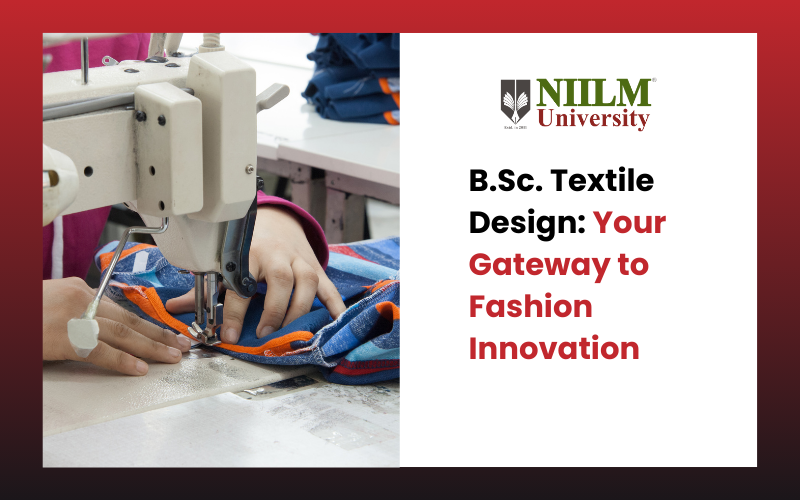Admission Enquiry

Innovate in fashion with a B.Sc. in Textile Design from NIILM University. Explore creative design, techniques, and industry trends.
In the ever-evolving world of fashion, innovation and creativity are key to standing out. The Bachelor of Science (B.Sc.) in Textile Design degree equips graduates with a special combination of technical know-how and artistic expression, positioning them for leadership roles in the fashion and textile sectors. Through the integration of cutting-edge technology and traditional craftsmanship, this extensive program gives students the knowledge and abilities they need to design and produce cutting-edge textile products.
Join us on this exciting journey where creativity meets science, and transform your passion for textiles into a rewarding career.
What is B.Sc. Textile Design?
A Bachelor of Science degree in Textile Design (B.Sc.) blends the science of textiles with design ideas. Students who complete the program will be prepared to design and oversee the manufacture of textile items from conception to completion. It addresses many subjects, including production methods, design procedures, and textile materials.
Why Pursue a B.Sc. in Textile Design?
Benefits of a Degree in Textile Design
Expertise in textile science, design, and production is provided via a B.Sc. in Textile Design, which also offers beneficial industry links through internships.
Career Opportunities
Graduates can work as engineers, fashion advisors, textile designers, product developers, or entrepreneurs. Research and marketing positions are also open to them.
What You Will Learn in a B.Sc. Textile Design Program
The curriculum of a B.Sc. in Textile Design covers both theoretical and practical aspects of the field.
Fabric Science and Technology
Discover the various kinds of fabrics, their characteristics, and their manufacturing processes.
Textile Manufacturing Processes
Examine the methods used to create textiles, such as weaving, dying, and spinning fibers.
Fashion Illustration and Design
Improve your ability to visualize textile patterns and create fashion ideas.
Textile Testing and Quality Control
Recognize how to assess fabrics for performance, comfort, and durability.
Skills Acquired Through the Program
- Acquire the ability to imagine and produce original textile designs.
-Acquire practical knowledge of textile production methods.
- Gain experience overseeing design projects from inception to conclusion.
The Role of Technology in Textile Design
Innovations in Textile Design Technology
Modern textile design heavily relies on technology. The creation and use of fabrics are changing due to innovations like 3D textile design and digital fabric printing. Designers can play with novel textures, patterns, and features thanks to these technologies.
How Technology is Shaping the Future of Fashion
The limits of fashion design are being pushed by technology. Innovation in technology is driving the transformation of the fashion business, from wearables to sustainable production techniques. Anyone interested in a career in textile design should be aware of these developments.
Job Roles in B.Sc.Textile Design
With a B.Sc. in Textile Design, you can explore various career paths. Here are some job options:
Textile Designer: Design textiles with patterns, hues, and textures for clothing, home goods, and accessories.
Fashion Designer: Include textile design with an emphasis on fabric innovation and selection in garment collections.
Product Development Specialist: Work together with producers to create new textile goods and guarantee high standards.
Colorist: Work on textile collection color schemes and trends that will impact fashion and home design.
Textile Technologist: Investigate and create novel materials and methods while guaranteeing sustainability and usability.
Production Manager: Supervise the production process to guarantee that textiles are manufactured effectively and in accordance with design standards.
Textile Consultant: Provide expertise to brands or companies on fabric selection, trends, and sustainability practices.
Conclusion
In conclusion, more than merely a degree, a B.Sc. in Textile Design opens doors to a world of creative and innovative fashion. This curriculum offers a plethora of opportunities, whether your interest is in creating the next major fashion trend or learning about the newest textile technologies. A strong education, practical experience, and a love of textiles can help you pursue a prosperous career in this fascinating industry.
Frequently Asked Questions (FAQs)
Q1. What distinguishes a fashion design degree from a B.Sc. in textile design?
A1. While a fashion design degree concentrates on the design of apparel and accessories, a B.Sc. in textile design concentrates on the manufacturing and production of materials. Although their areas of focus are different, both fields are connected.
Q2. What kind of work is a B.Sc. in Textile Design likely to get me?
A2. You can work as a textile designer, product developer, textile technologist, fashion consultant, or in other fields with this degree.
Q3. How long does a B.Sc. in Textile Design take to complete?
A3. A B.Sc. in Textile Design normally takes three to four years to finish, depending on the course of study and type of university.
Q4. Are programs in textile design offering alternatives for study abroad?
A4. Yes, a lot of programs provide chances for studying abroad through partnerships with foreign universities, exchange programs, and internships.
Q5. What are the most important abilities for a successful textile design career?
A5. Creativity, technical textile production knowledge, design proficiency, project management abilities, and client-facing skills are essential.
Copyrights © 2024 NIILM UNIVERSITY. All rights reserved.